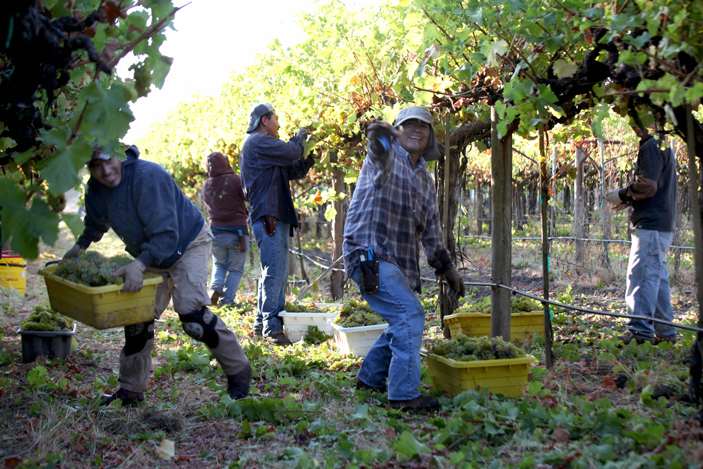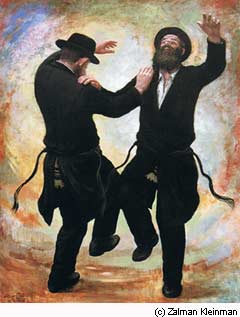 Repentance
Repentance Entries in Repentance (12)
Cheap Words; Costly Repentance
 Friday, July 24, 2020 at 11:35AM
Friday, July 24, 2020 at 11:35AM  Words are cheap. It’s easy to tell someone what they want to hear. Deeds are costly, because we can only do one thing at a time. To do one thing is to say “no” to 10,000 others in that moment. To merely say something is to leave our options open: who knows what might happen next?
Words are cheap. It’s easy to tell someone what they want to hear. Deeds are costly, because we can only do one thing at a time. To do one thing is to say “no” to 10,000 others in that moment. To merely say something is to leave our options open: who knows what might happen next?
Tucked away in Matthew’s gospel (and only Matthew’s gospel, 21:28-32) is the short parable of two sons:
“What do you think? There was a man who had two sons. He went to the first and said, ‘Son, go and work today in the vineyard.’
“‘I will not,’ he answered, but later he changed his mind and went.
“Then the father went to the other son and said the same thing. He answered, ‘I will, sir,’ but he did not go.
“Which of the two did what his father wanted?”
“The first,” they answered.
Jesus said to them, “Truly I tell you, the tax collectors and the prostitutes are entering the kingdom of God ahead of you. For John came to you to show you the way of righteousness, and you did not believe him, but the tax collectors and the prostitutes did. And even after you saw this, you did not repent and believe him."
You can tell it’s a repentance story by the way Jesus connects it to John the Baptist’s ministry, which was all about repentance. But there’s a key moment before last verse. The first son “changed his mind” (v 29, and also 32) and then went out to work in the vineyard. This isn’t the normal word we associate with repentance, it’s closer to the idea that he changed his cares. It’s as if the very moment he said “no” it created a kind of anxiety that dogged his steps the rest of the day—until he simply headed out to the vines and started doing the work.
As in so many parables, perhaps Jesus invites us to read behind the lines. I began to wonder, “What kind of son blurts out ‘No’ but then lives out ‘Yes?’” And why didn’t the father try to correct the son immediately? And why does the second son so easily say “Yes” but so easily does his own thing without regard to either his father or his own words? Clearly there are at least two kinds of people in the small world of this story: people who lead with their feelings and those who cover their feelings with the “right words.”
The first son doesn’t want to go to work that day, and he doesn’t care who knows it. But something tugs at him. We don’t know how long the tug-of-war went on but we do know the result: the son does what the father asks. Not long after Jesus tells this story, we see Jesus in the Garden of Gethsemane telling his Father that he would prefer another path. From the many Biblical descriptions of that prayer in the garden we learn that it was powerfully charged with emotion; it was raw with honesty and struggle.
The second son knows exactly what the father wants to hear and says it immediately, even easily. Jesus leaves us to wonder whether the second son ever had any intention of going to work. Maybe he did; maybe not. Maybe he was on his way to the vineyard and fell prey to distraction or amusement. Maybe he knew from the start that he was going to stay home and play video games. Maybe the father knew it, too. (This is part of the beauty of parables: there are so many maybes!)
But Jesus has a definite purpose in the parable. His audience are the religiously-minded Pharisees, who were experts in saying the right things while doing the wrong ones. They were practiced in appearances. They were religious professionals. They were also among those who demanded the death of Jesus.
But just so we wouldn’t miss his meaning, Jesus jumps from the parable to real life. The tax collectors and whores of that culture know the tug-of-war. They care about what they say—and do. They are capable of feeling remorse and changing direction. The beauty of John the Baptist’s ministry was how he provided a way for those who were on the outside to find their way back into God’s kingdom: it was “the way of righteousness” (v 32). Remorse that leads to repentance means return and restoration. It’s the way back. In a chilling final application of the parable, Jesus pointed out that those who were practiced at saying the right things may be the very people incapable of feeling the right thing.
As with so many of the Lord’s parables, we are left to wonder which group we are in. It is a common weakness among Christians to mistake knowing the right answer for living the right answer. Life with God is never a written exam; it is always a practical one. Will I find myself playing religious games with religious friends, or will I find myself among God’s true people, doing God’s good work?
Judgment: An Enemy of Repentance
 Friday, July 10, 2020 at 01:21PM
Friday, July 10, 2020 at 01:21PM  I have amazing superpowers, and plenty of them:
I have amazing superpowers, and plenty of them:
- On the freeway, from inside my own car, I can spot “idiots” by the way they drive. (And believe me, there are loads of idiots!)
- On social media, I can discern the tone of voice in a text, a Tweet or a Facebook post. If I’m watching a video, I can go beyond tone of voice and tell you the exact motivation of the person posting.
- While reading the New York Times I possess all the insight needed to instantly solve all the world’s problems (even though a reporter from the Times has never called me to ask my opinions).
You get the idea: my superpowers are a dazzling combination of mindreading and deep analysis. I’m a mash-up of Megamind and Mother Teresa.
Of course, the scripture doesn’t use the term superpower. It doesn’t look like Jesus is impressed at all:
Do not judge, or you too will be judged. For in the same way you judge others, you will be judged, and with the measure you use, it will be measured to you. Why do you look at the speck of sawdust in your brother’s eye and pay no attention to the plank in your own eye? How can you say to your brother, ‘Let me take the speck out of your eye,’ when all the time there is a plank in your own eye? You hypocrite, first take the plank out of your own eye, and then you will see clearly to remove the speck from your brother’s eye. (Matthew 7:1-5)
If you’re into being in control, being a judge is a great deal. Think of a courtroom: judges do not repent, defendants do. The judge sits above the situation. In fact, the judge sits above everyone else in the room! Everyone else in the room wants to win the judge’s attention and approval. Ultimately, the judge gets to decide who gets to say what, and how much they get to say. Argue with the judge you will be met with a contempt of court citation—which you cannot challenge or contest. It is final.
The habitual practice of judgment is an enemy of repentance. As soon as I cast myself in the role of judge, I have excused myself of the need to repent, because after all, it’s all about me. Come to think of it, only three kinds of people wear flowing black robes: graduates (who think they know more than they do), judges (who hold all the cards, and wizards (who, admittedly, are pretty cool—but far less common than the first two).
It doesn’t take long to get used to wearing the robe, holding the gavel, and sitting high above other people. But I do so at my own peril: I quietly have given myself permission to be the lord of all I survey. Sure, Jesus may be “Lord of all,” but I am lord of all I see. I may never express it in these terms, but I become the god of my world—and every day is Judgment Day as I scrutinize the actions of others.
Repentance requires a complete role-reversal. I am the one standing before the judge. I look up to the seat of judgment—true judgment, fair judgment, God’s kind and loving judgment. In truth, until I place myself in this role there is a part of God’s personality I will never experience. One reason I hesitate to come before the One True Judge is that I think he will treat me the way I have treated others.
Learning the posture of repentance and disciplining myself to pay careful attention to each word uttered by the Great Judge of All is actually a formative experience. To step into God’s courtroom is to see myself more clearly and position myself for change. The prophet Isaiah had just such a formative experience. In a mystical moment he came before the Creator of all the earth:
In the year that King Uzziah died, I saw the Lord, high and exalted, seated on a throne; and the train of his robe filled the temple. Above him were seraphim, each with six wings: With two wings they covered their faces, with two they covered their feet, and with two they were flying. And they were calling to one another:
“Holy, holy, holy is the Lord Almighty;
the whole earth is full of his glory.”At the sound of their voices the doorposts and thresholds shook and the temple was filled with smoke.
“Woe to me!” I cried. “I am ruined! For I am a man of unclean lips, and I live among a people of unclean lips, and my eyes have seen the King, the Lord Almighty.”
Then one of the seraphim flew to me with a live coal in his hand, which he had taken with tongs from the altar. With it he touched my mouth and said, “See, this has touched your lips; your guilt is taken away and your sin atoned for.” (Isaiah 6:1-7)
What was at first a dreadful sight led Isaiah to understand two key insights about his culture and himself: “I am a man of unclean lips, and I live among a people of unclean lips.” But instead of experiencing punishment, he experienced cleansing—and a new calling on his life.
Why has it taken me so long to realize that my judgments—made so quickly and with such confidence—block the still, small voice of the Spirit? By disciplining myself to remain open and humble I position myself to hear from God. It's not that the Spirit isn't speaking, it's that I have trained myself to listen to my own voice first.
This is part of what it means to apply Proverbs 3: 5 "Trust in the Lord with all your heart, and do not rely on your own insight." But how deeply I have trained myself to rely upon my own insights! The Holy Spirit is always present; I must cultivate a patient and listening heart. Sometimes I will see deeper than any human judge could see, and other times I may hear the gentle whisper, “Repent!”
Repent Before You Start Your Day
 Tuesday, June 9, 2020 at 11:06AM
Tuesday, June 9, 2020 at 11:06AM  It’s confession time: I've been working on a book about repentance. But the more I prepared to write this book the more I had to admit I knew little to nothing of repentance. I understood that in order to “become a Christian” I needed to admit that I was a sinner and rely on Jesus’s sacrifice to take away my sins. As I studied about repentance I learned the Old and New Testament concepts of repentance (retrace and rethink). But even after months of reading and study I knew nothing of howto repent as a regular part of life with God.
It’s confession time: I've been working on a book about repentance. But the more I prepared to write this book the more I had to admit I knew little to nothing of repentance. I understood that in order to “become a Christian” I needed to admit that I was a sinner and rely on Jesus’s sacrifice to take away my sins. As I studied about repentance I learned the Old and New Testament concepts of repentance (retrace and rethink). But even after months of reading and study I knew nothing of howto repent as a regular part of life with God.
Then one morning, in my daily reading of scripture, a thunderbolt from heaven leaped from the pages of Matthew’s gospel! I looked at the page again, just to be sure the paper had not been singed by the lightning (It hadn’t been burned, but I was on fire from the spark.) Be careful now before reading these verses; they are capable of changing your life:
Then Jesus said to His disciples, “If anyone wishes to come after me, he must deny himself, and take up his cross and follow me. For whoever wishes to save his life will lose it; but whoever loses his life for my sake will find it. (Mathew 16:24-25)
I know. The word repentance doesn’t appear in the text, but believe me: it’s there—especially for those of us who long to learn repentance as a lifestyle of walking with Jesus.
Perhaps you’ve thought of repentance as an after-the-fact maneuver, something you do when you realize you’ve messed up. Indeed, this is true: we should repent whenever we realize our failures. But what if repentance could keep us from sin? What if there was a daily habit could help us continually by keeping us from foolish choices and errors? If you have thought of repentance as a bedtime exercise, there’s good news: repentance can also be morning devotion.
Jesus provides three daily choices; morning-time choices that help us repent of the illusion that our life is our own. Every follower of Jesus must choose the way of Christ again and again. Indulge me in some foolishness:
Each morning Lydia opens her eyes to see the same ceiling, the same room, hearing the same sounds, and immediately her mind runs toward the new day: there are tasks to be done and appointments to be kept. But before her feet swing over the side of the bed and touch the floor there is a struggle to be met—and won: does this day belong to her, or Someone else? Lydia fights the most important battle of the day before any action is ever taken. Every single morning she rethinks her life in light of God’s kingdom. She is reminded of the three choices facing every disciple, every day:
Deny ourselves.
Take up our cross.
Follow Jesus.
Is Lydia really willing to yield her priorities, tasks, and schedule? For her (and us) it’s not a matter of doing different tasks or changing careers—it’s a matter of deciding who is boss again today, of repenting from the universal tendency to think we are the masters of our fate.
To settle these questions each morning is a way of repentance, of rethinking our life in light of the King and his kingdom. Three choices, made each morning, can grow us into mature disciples, capable of experiencing the with-God kind of life.
Have you ever wondered—in practical terms—what it means to deny yourself? J.B. Phillips renders the first choice “give up all right to himself.” To deny yourself does not mean torture or self-abuse. It does not mean to despise yourself. It means you make the ongoing choice that your life is not your own, that it is in fact God’s, and God is a better manager of your life than you are! To deny yourself means recognizing who holds the “rights” to your life.
Secondly, to take up your cross means to receive again the sacrificial posture modeled by Jesus, who did not consider his life his own, but instead thought of his life in terms of the mission he received from his Father. The cross was a part of that mission. Jesus went to Jerusalem, where he knew death awaited. He picked up the cross and carried it to death’s hill. He laid himself down in accordance with the Father’s wishes and gave his life up willingly. This, too, is our invitation.
God has a cross for each of his children, according to his highest hopes and best plan for each one of us. Our mission—our cross—will not be identical to Jesus’s. Only he was capable of shedding his blood for the sins of all humankind. But our cross will involve the same elements: understanding God’s plan for us, going where God leads, working through our own fears, and embracing the means of sacrifice he has chosen for each of us. “The cross” is no mere metaphor—we are, each of us, called to die to our self, die to our priorities, and place ourselves completely in the hands of the resurrection God.
Finally, we follow. To follow Jesus is to walk in the manner he walked. Have you thought about how Jesus conducted himself each day? Do you believe it’s possible for you conduct yourself in the same radical obedience as Jesus? To display the same grace he showed toward each person he met? To welcome whomever the Father brings into our path throughout the day?
His life was unique, and so is yours! What he said and did was his mission, fully submitted to the Father day by day. Imagine the possibilities of his lifestyle reproduced in you, in your setting, among your family and community, in your culture and country. It’s possible, especially when you embrace these three repentance choices each morning.
Do The Teshuva!
 Thursday, July 25, 2019 at 03:52PM
Thursday, July 25, 2019 at 03:52PM  From the Charleston to the Mashed Potato to Flossing, every dance move needs a name; but if you want to do the Teshuva, you’ll need a Rabbi to show you how.
From the Charleston to the Mashed Potato to Flossing, every dance move needs a name; but if you want to do the Teshuva, you’ll need a Rabbi to show you how.The Day the Cows Repented
 Tuesday, July 16, 2019 at 10:12AM
Tuesday, July 16, 2019 at 10:12AM  No details. Just an eight-word prophecy of destruction, delivered by a strange-looking foreigner. A man with ragged clothes and ugly skin walked through the heart of a great city and repeated himself over and over: “Yet forty days and Nineveh will be overthrown.”
No details. Just an eight-word prophecy of destruction, delivered by a strange-looking foreigner. A man with ragged clothes and ugly skin walked through the heart of a great city and repeated himself over and over: “Yet forty days and Nineveh will be overthrown.”
This is the story of a God named Yahweh, a man named Jonah, and a city called Nineveh: a city 600 miles away from Jerusalem, a city known for its wealth, its size—and its barbarity. God sent a nobody (a Jewish prophet) to warn the Assyrian city of Nineveh that destruction was coming. Without advertising in advance, without setting up a diplomatic meeting between representatives of two countries, God’s message was plain and direct: in forty days your capital city is doomed.
And then something remarkable happened. The people of the city listened to the message. Really listened. From the city streets and among the storefront shops a grassroots response grew. People believed the message and took action: they repented. In the ancient world there were protocols for repentance, outward actions that signaled you were turning around. The people of Nineveh quit eating. They took off their work clothes or party clothes and dressed in burlap sacks, rich and poor alike agreed on these signs as a response, “We hear you, God of Israel, and we will change.” Even the king of Nineveh, isolated in his royal palace, became one with his people, fasting and shedding the royal silks. He took the cold ashes from the fireplace and poured them on his head.
Just in case there was someone who had not yet gotten with the program the king sent out a formal notice: “Everybody: repent.” And the king meant everybody: his decree went a step further and demanded that the livestock of the city should join in these acts of repentance. “Stop feeding your animals,” he said, “Let them repent with us.” Can you imagine the noise rising up from the city as from every stall, every pen, and every chicken coup the animals began to complain? Even the lowing of the cattle rose up as a prayer of repentance. It was the day the cows repented. And Yahweh heard. He saw that from great to small, from human to bovine, this group of people was willing to change their ways.
Here’s the thing about God: his pronouncements of judgment are not final; they are invitations to repent. The message delivered by the prophet had started a countdown to destruction, but God could stop the clock—and he did so when he saw the response rise up from the streets and reach the highest levels of government. These people took judgment seriously, and God took them seriously. Crisis, averted; peace, restored; mercy, bestowed.
Here’s the thing about repentance: anyone can do it, apparently even your livestock. You don’t have to be a religious person. You don’t have to be a citizen of a select nation. To anyone willing to change God gives the grace for change. Repentance is the outward sign of an inner willingness.
And here’s another thing about repentance: it’s not about the messenger. One of the most surprising aspects about the Old Testament book of Jonah is that Jonah, the prophet, is the “bad guy” in this story. Even though he hears a message directly from God, he has no intention of delivering it because he thinks the people receiving the message do not deserve God’s mercy (check out Jonah 4:2 for the interpretive key to the entire book). Jonah tries to get as far away from Nineveh as he can—but he’s overruled by God (and an enormous fish). Jonah finally delivers the message. You can imagine the begrudging, snarling tone of voice as Jonah walks through the massive city for three days. The people respond, but he’s livid when the people of Nineveh repent. He cares more about having a shady hillside perch so he can watch the fire and brimstone fall. Even though the messenger is filled with hatred for these people, they receive the message. Even though the messenger delivers the message in the most perfunctory way, they receive the message. Even though the messenger is rooting for their own destruction, they receive the message. Wouldn’t it be a tragedy for you or me if we let someone else get in the way of our repentance?
But that would never happen in our day. It would never happen to you or me. It only happens in old Bible stories, right? Right?

